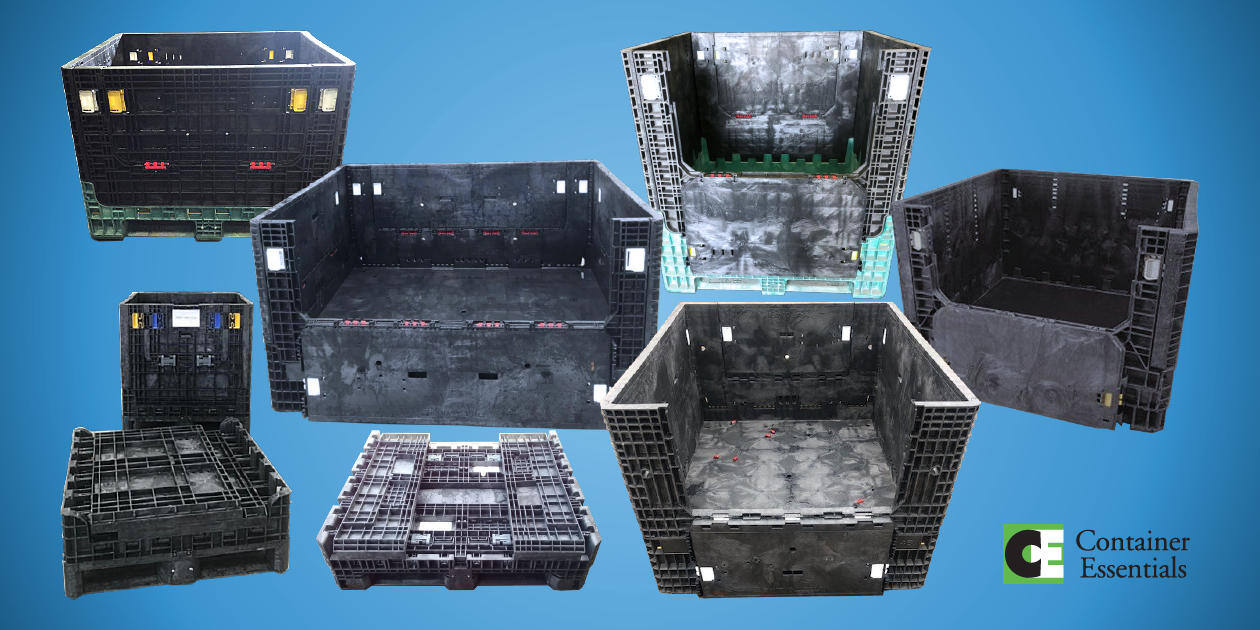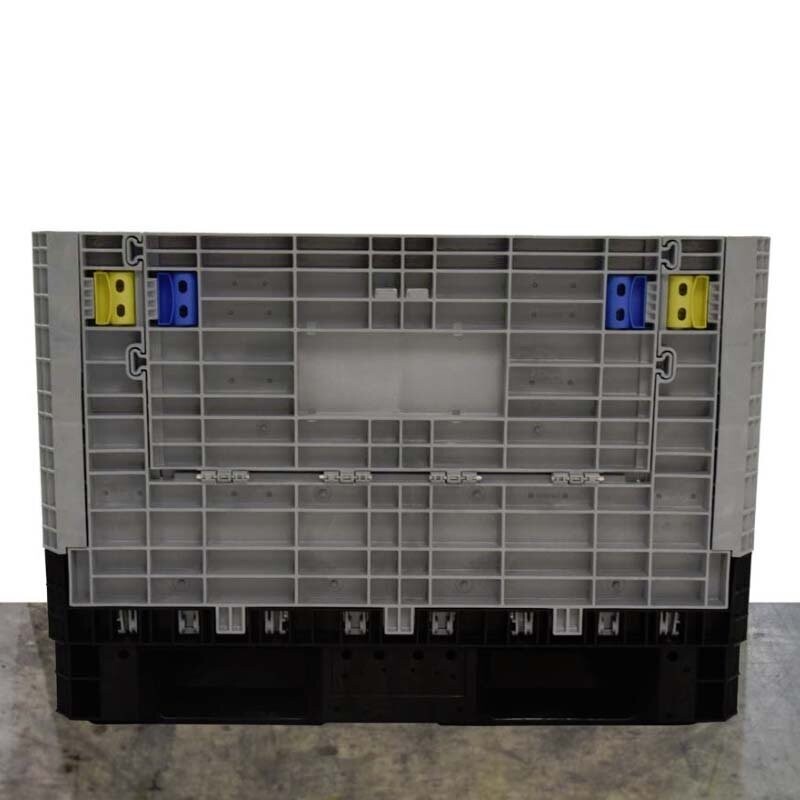Explore efficient storage ideas using refurbished bulk containers in manufacturing
Wiki Article
Why Mass Containers Are Crucial for Sustainable and Cost-Effective Transport
Bulk containers play an essential duty in modern-day logistics. They assist in the effective movement of huge quantities of goods, therefore enhancing transportation procedures. This approach not just lowers expenses but additionally lessens environmental effect through reduced discharges and waste generation. As industries look for more sustainable techniques, the adoption of mass containers is coming to be progressively significant. What ramifications does this shift hold for future logistics and supply chain monitoring?
The Benefits of Making Use Of Bulk Containers in Logistics
Mass containers transform logistics by enhancing effectiveness and sustainability. These containers permit for the transportation of huge quantities of items in a single journey, considerably reducing the number of journeys required. This not just enhances procedures but also lessens labor expenses associated with handling, loading, and discharging. In enhancement, mass containers are designed to optimize area usage within transportation cars, guaranteeing that even more items can be delivered all at once.The standardization of bulk containers likewise streamlines the logistics procedure. With uniform measurements, they can be conveniently piled and kept, leading to improved warehouse monitoring. Moreover, bulk containers usually feature resilient products that secure components from damages during transportation, thereby lowering product loss and increasing general integrity. As a result, companies can experience enhanced supply chain performance, ultimately resulting in boosted success and client satisfaction. This mix of factors makes mass containers an essential asset in modern logistics.
Ecological Influence: Minimizing Waste and Carbon Impact
As markets significantly focus on sustainability, the fostering of bulk containers has become a vital approach for lowering waste and decreasing carbon footprints. These containers decrease making use of packaging products, such as boxes and plastic, thereby notably reducing general waste generation. By consolidating deliveries, mass containers boost transport efficiency, enabling even more items to be transported per trip. This decrease in journeys straight associates with reduced greenhouse gas discharges, adding to a smaller sized carbon footprint.Mass containers can typically be recycled or recycled, better alleviating environmental effect. The resilience of these containers guarantees they can hold up against several transport cycles, minimizing the demand for single-use choices. used collapsible bulk containers. By simplifying logistics and promoting reliable resource use, mass containers not just support sustainable methods however also motivate markets to straighten with global environmental goals. Eventually, their execution reflects a commitment to eco-friendly stewardship and responsible resource administration
Price Savings: Exactly How Mass Containers Lower Transport Expenditures
While numerous business seek ways to enhance their bottom line, the usage of mass containers offers a considerable chance for reducing transportation expenses. Mass containers take full advantage of the volume of products transported, allowing businesses to ship larger quantities at as soon as. This performance reduces the variety of trips called for, straight decreasing fuel costs and lessening labor expenditures connected with loading and dumping.Furthermore, bulk containers commonly include structured layouts that enhance room utilization within transportation lorries. This indicates fewer empty spaces, bring about extra effective usage of readily available capability. Additionally, the durability of bulk containers can reduce the risk of item damages during transportation, lowering losses and making sure that even more goods get here intact.
Enhancing Supply Chain Efficiency With Mass Storage Solutions
Mass storage remedies play a necessary function in boosting supply chain efficiency by optimizing supply administration. By consolidating items into less, larger containers, businesses can considerably decrease taking care of prices related to frequent transfers and processing. This structured approach permits much better monitoring and management of inventory, eventually leading to improved operational performance.Structured Inventory Monitoring
Efficient stock monitoring is vital for maximizing supply chain procedures, particularly when organizations embrace bulk storage options. These solutions enable companies to keep higher supply levels while reducing the regularity of replenishment. By settling products into bulk containers, business can streamline their inventory processes, minimizing the intricacy related to tracking numerous smaller packages. This method assists in precise stock counts and improves projecting accuracy, allowing for more informed decision-making. In enhancement, mass storage space options simplify storage facility organization, making it easier to locate and access items when required. Therefore, organizations can attain an extra effective inventory turnover price, eventually boosting overall supply chain performance and lowering the chance of stockouts or overstock circumstances.
Reduced Handling Costs
The application of mass storage services not just simplifies supply administration yet also significantly lowers handling costs across the supply chain. By settling materials right into bulk containers, firms decrease the need for constant handling and transfer between different storage space and transportation systems. This approach reduces labor costs linked with loading, discharging, and moving smaller bundles. Additionally, mass storage space lowers the regularity of shipments, leading to lower transportation prices and decreased fuel consumption. Therefore, organizations can maximize their logistics procedures, permitting an extra efficient allocation of sources. Inevitably, reduced dealing with costs contribute to enhanced overall supply chain performance, cultivating a setting that supports both sustainability and economic viability.
Flexibility of Bulk Containers Throughout Numerous Industries
Many sectors have unique needs for transport and storage, mass containers have emerged as a functional service that meets a wide array of requirements. These containers, ranging from huge bins to specialized tanks, can suit diverse products, including powders, granules, and fluids. In the farming market, mass containers assist in the transport of fertilizers and grains, while the food and drink industry utilizes them for active ingredients and completed products. The chemical industry relies upon mass containers for securely delivering dangerous products, making sure compliance with security guidelines. Furthermore, building firms take advantage of bulk containers for moving aggregates and other products. Their flexibility extends to different modes of transport, consisting of trains, ships, and vehicles, improving logistical performance. This versatility not only simplifies operations across different markets yet likewise promotes sustainability by decreasing product packaging waste and maximizing area en route. Mass containers play a crucial function in modern-day supply chain monitoring.Future Fads in Mass Container Use and Sustainability
The future of mass container use is increasingly shaped by ingenious products advancement that improves sustainability. In addition, automation in logistics assures to streamline operations, reducing waste and enhancing performance. Welcoming round economic situation techniques will certainly further revolutionize how bulk containers are created, made use of, and recycled, fostering a more lasting transport landscape.Ingenious Materials Development
As sectors increasingly prioritize sustainability, ingenious products growth wholesale containers arises as a considerable consider enhancing environment-friendly transport remedies. Manufacturers and scientists are exploring eco-friendly plastics, recycled composites, and lightweight metals to decrease ecological impact. These products not only lessen waste but additionally improve gas effectiveness by lowering the total weight of containers. Additionally, developments in wise materials, which can adjust to varying conditions, improve the sturdiness and capability of mass containers. The integration of these cutting-edge materials aligns with round economic climate concepts, promoting reuse and recycling. As the need for lasting practices expands, the growth of such materials will certainly play a vital function in forming the future of mass container usage in logistics and transportation.Automation in Logistics
Substantial advancements in automation are poised to change logistics and the application of bulk containers, improving sustainability in transport. Automated systems, consisting of drones and independent cars, are streamlining the movement of bulk containers, minimizing the reliance on standard fuel-powered transport. These innovations maximize routing and loading processes, reducing empty miles and enhancing fuel effectiveness. In addition, automated supply management systems enhance tracking and monitoring of bulk containers, ensuring better resource allotment and decreased waste. The combination of the Web of Things (IoT) allows real-time data analysis, enabling aggressive decision-making that straightens with sustainability objectives. As automation remains to develop, it is expected to drive further developments wholesale container usage, inevitably sustaining more sustainable logistics techniques and lowering the ecological impact of transportation.Round Economy Practices
Innovations in automation are establishing the stage for a more incorporated technique to circular economic situation techniques in the domain name of bulk container use. As markets increasingly welcome sustainability, mass containers website here are being created for durability and reusability. This shift not just minimizes waste yet likewise enhances source efficiency. Firms are taking on approaches such as closed-loop systems, where used containers are accumulated, refurbished, and reestablished right into the supply chain. In addition, clever innovations track container life process, promoting much better monitoring and lowering ecological effect. The partnership between makers, logistics carriers, and end-users is crucial in developing standards for sustainable container use. used collapsible bulk containers. Future fads indicate a growing focus on materials that are naturally degradable and recyclable, more reinforcing the circular economic climate's concepts wholesale transport
Often Asked Inquiries
What Materials Are Bulk Containers Commonly Made From?
Bulk containers are usually created from durable products such as high-density polyethylene, aluminum, cardboard, and steel. These materials supply toughness, flexibility, and protection, making them appropriate for transferring numerous items in various markets effectively.How Do I Choose the Right Size Bulk Container?
Selecting the best size mass container includes examining the quantity of materials to be carried, thinking about managing tools compatibility, and evaluating storage area requirements. Proper dimension assurances efficiency in transport and decreases waste throughout delivery.Are Mass Containers Reusable or Recyclable?
Bulk containers are frequently reusable, made for several trips, boosting sustainability. Lots of can likewise be recycled, depending upon the materials made use of. Selecting recyclable options further reduces and supports environmental objectives waste in transportation techniques.What Security Rules Put On Mass Container Transportation?
Safety and security laws for mass container transport read more include conformity with the Division of Transport guidelines, correct labeling of dangerous materials, architectural stability evaluations, and adherence to weight restrictions to ensure secure handling and protect against mishaps during transportation.Exactly How Can Businesses Shift to Using Mass Containers Successfully?
Businesses can transform to bulk containers by evaluating existing logistics, training personnel on handling, buying ideal tools, optimizing inventory management, and teaming up with vendors to guarantee compatibility and effectiveness throughout the supply chain.
As markets progressively focus on sustainability, the adoption of mass containers has actually arised as a key method for reducing waste and reducing carbon impacts. By combining materials right into mass containers, companies can improve their supply procedures, lowering the complexity associated with tracking multiple smaller sized packages. As industries progressively focus on sustainability, cutting-edge materials advancement in mass containers emerges as a considerable element in boosting eco-friendly transport solutions. Automated systems, consisting of drones and self-governing cars, are streamlining the activity of mass containers, reducing the dependence on standard fuel-powered transportation. Additionally, automated stock management systems enhance monitoring and tracking of bulk containers, guaranteeing better source allotment additional resources and minimized waste.
Report this wiki page